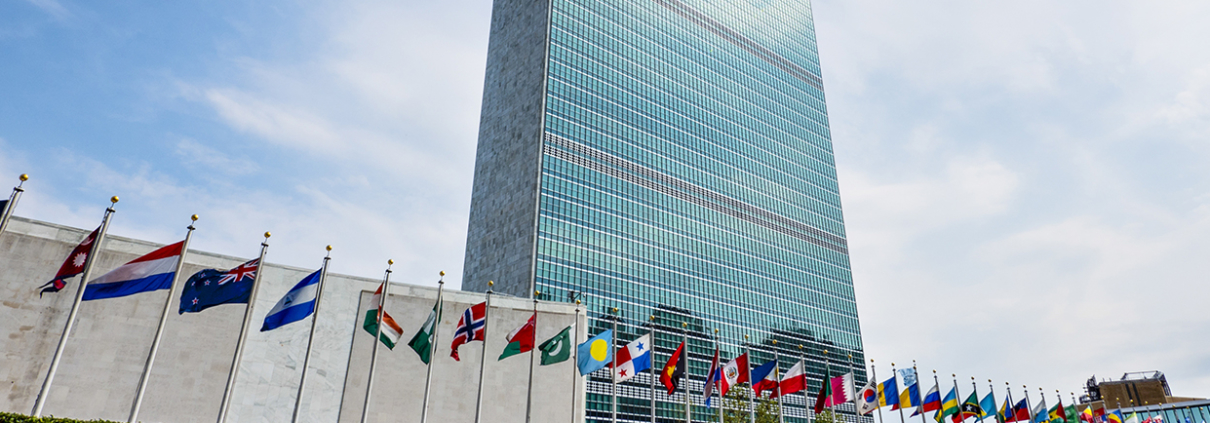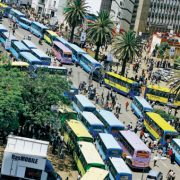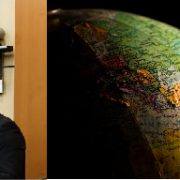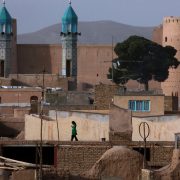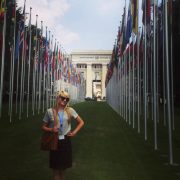Inside View of Advocacy-Driven Research for an International Organization
By Suzanne Caflisch MURP ’21
One of the biggest deciding factors in my choice to attend UCLA’s Master of Urban and Regional Planning program was the opportunity to apply planning to the field of international development. Needless to say, the Global Public Affairs (GPA) program stood out as an important network to tap into during my time at Luskin.
For my GPA summer fellowship, I was placed at Namati, an international non-governmental organization that supports grassroots legal advocates (also known as community paralegals) who advance legal empowerment for communities and vulnerable populations.
Namati also convenes the Legal Empowerment Network, a platform for more than 2,000 justice defender organizations from 160 countries to learn from one another and share findings in their work to advance justice for all. Finally, Namati is a research organization and has released various publications including books, policy briefs, peer-reviewed articles and guides that focus on how to achieve justice for communities around the world.
I had initially planned to undertake the fellowship in Namati’s Washington, D.C., office, but the COVID-19 pandemic made it impossible to relocate for the summer. I feared that a remote placement might hinder my immersion onto the team and pose a setback to my contributions, but I was fortunate that my team was already meeting virtually because staff members live around the world. Thus, the remote nature of the work did not present obstacles to my fellowship.
I worked as a global advocacy fellow for Namati’s Network and Advocacy Team, which runs the Legal Empowerment Network and conducts various learning initiatives.
Even though I entered the position without a background in legal studies, I quickly became interested in applying the principles of legal empowerment to my research as a planning student. For my upcoming senior thesis, I plan to study waste picker organizing in Brazil and other countries in Latin America. Thus, this fellowship prompted reflection on how grassroots groups like associations of waste pickers can use the law to shape inclusive policies that afford them greater rights. It also prompted me to consider the importance of citizen participation in policymaking, which allows citizens from marginalized backgrounds to have input on laws that will affect them.
In all, I spent three months as a Namati fellow and had the opportunity to work on a wide variety of projects, which are elaborated below.
High-Level Political Forum (HLPF)
I virtually attended the United Nations High-Level Political Forum, the main U.N. platform on sustainable development. Each year, the HLPF meets to review the 2030 Agenda for Sustainable Development and the Sustainable Development Goals (SDGs) at the global level. I attended key events related to justice and SDG16, which focuses on promoting just, peaceful and inclusive societies. During the event, I live-tweeted key announcements and updates from Namati’s Twitter account, and later I wrote a blog post summarizing key takeaways from the event. I also helped rank videos submitted by grassroots justice organizations for an HLPF event held by Voices of SDG 16+, a collaborative campaign to bring together civil society organizations that are working toward meeting the SDG16 goals.
COVID-19 Grassroots Justice Fund
In response to COVID-19, Namati and several partner organizations launched the COVID-19 Grassroots Justice Fund, which responds to justice crises that have been exacerbated by the pandemic, including rampant infections among prisoners, heightened gender-based violence and land grabs by private interests. I provided support in the research and communications behind the fund. I drafted the fund FAQs and created a mailer to be sent to Namati’s global network and partners. I also researched potential donor organizations that might make a contribution to the fund. Finally, I helped score and rank applications of grassroots organizations.
COVID-19 learning tasks
Because of the unprecedented circumstances of the COVID-19 pandemic, there was great interest in learning more about how the pandemic impacted grassroots organizations working on justice issues around the world. I conducted initial research on two major learning tasks in this area. First, I examined feedback from the Legal Empowerment Network member organizations about the importance of finance and government stimulus packages to support access to justice in the wake of the COVID-19 pandemic. Separate from this task, I mapped current research activities being undertaken by outside international organizations like Pathfinders, the U.N. Development Programme, and the World Justice Project to understand gaps in organizational knowledge that Namati might fill with future research.
Latin American initiatives
I applied my Portuguese knowledge to various programmatic initiatives in Latin America. I helped score applications to Namati’s Latin American Innovation Lab, which focuses on strengthening networks of legal empowerment organizations in Latin America. I also conducted interviews with staff from organizations based in Brazil, and I performed various translations between Portuguese and English.
Biden administration memo
I drafted a memo for the hopeful future Joe Biden administration on federal policies that can improve access to justice in both the domestic and international spheres. My recommendations included repurposing funding toward worldwide legal empowerment via a multilateral funding mechanism, advocating for international financial institutions to support communities negatively impacted by development projects, and decriminalizing non-lawyers who provide legal support in the U.S.
Op-ed on water access in informal settlements
Finally, I had the opportunity to write an op-ed article examining water access in global informal settlements in the wake of COVID-19. Namati colleagues helped me connect with civil society organizations and researchers in Argentina and Kenya to discuss their work with residents of informal settlements. I used my op-ed as a platform to apply a legal empowerment lens to issues of distributive justice in Global South cities, and to advocate for greater citizen participation in policymaking processes.
Reflecting on my fellowship
Looking back on my fellowship, three reflections emerge: First, I greatly appreciated the opportunity to assist with advocacy-driven research for an international organization such as Namati. Before taking this position, I had only done research in an academic environment and was interested in gaining a better sense of action-oriented research. This position strengthened my confidence that I could work in an international non-governmental organization like Namati, and can leverage my research skills to the causes I care about.
Second, I am extremely grateful for Namati’s supportive environment, which inspired me to take on new challenges. I have never worked for a team with such a strong spirit of collaboration and interpersonal rapport! This support was especially critical in light of the remote nature of the fellowship, which could have felt alienating had there not been a strong sense of community.
Lastly, I greatly appreciated the fellowship’s opportunities for professional development. Publishing an op-ed and blog post helped me grow my body of work and gain experience researching subjects that I am interested in, like infrastructure provisions in informal settlements. I also made connections with researchers with whom I plan to stay connected as I advance to writing a master’s thesis on the social inclusion of informal waste pickers in Brazil.
In summary, during the chaos of a global pandemic, national upheaval around racial violence, and ash from the California fires falling like snow outside my window, I was grateful for the opportunity to contribute to a team of dedicated professionals like Namati’s Network Team.
The COVID Grassroots Justice Fund is providing desperately needed financial support to civil society organizations suffering setbacks due to COVID-19. In the event that Joe Biden takes office, Namati’s policy recommendations for legal empowerment could guide the administration toward a stronger stance on climate, land and racial justice. I will leave this fellowship with a greater understanding of the importance of legal empowerment approaches to structural injustice, as well as a deep appreciation for the chance to work with an organization that brings together compassionate colleagues striving to make positive changes in the world.

